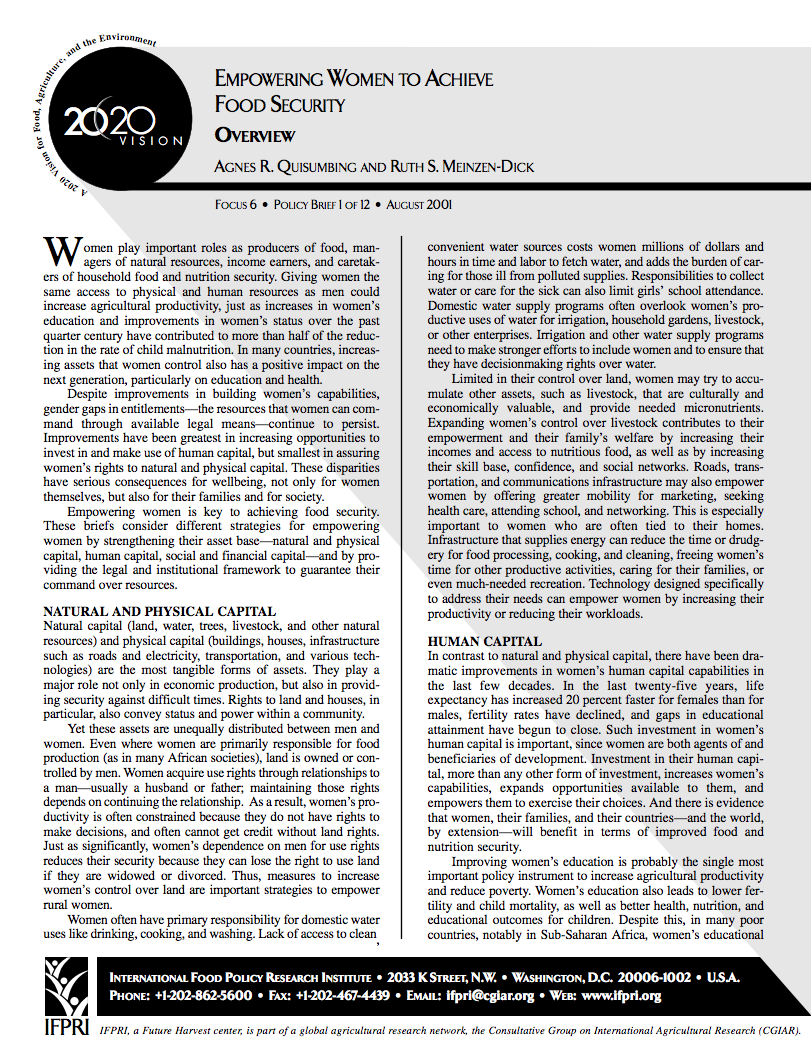Focal point
Location
About IFPRI
The International Food Policy Research Institute (IFPRI) provides research-based policy solutions to sustainably reduce poverty and end hunger and malnutrition in developing countries. Established in 1975, IFPRI currently has more than 500 employees working in over 50 countries. It is a research center of theCGIAR Consortium, a worldwide partnership engaged in agricultural research for development.
Vision and Mission
IFPRI’s vision is a world free of hunger and malnutrition. Its mission is to provide research-based policy solutions that sustainably reduce poverty and end hunger and malnutrition.
What We Do
Research at IFPRI focuses on six strategic areas:
- Ensuring Sustainable Food Production: IFPRI’s research analyzes options for policies, institutions, innovations, and technologies that can advance sustainable food production in a context of resource scarcity, threats to biodiversity, and climate change. READ MORE
- Promoting Healthy Food Systems: IFPRI examines how to improve diet quality and nutrition for the poor, focusing particularly on women and children, and works to create synergies among the three vital components of the food system: agriculture, health, and nutrition. READ MORE
- Improving Markets and Trade: IFPRI’s research focuses on strengthening markets and correcting market failures to enhance the benefits from market participation for small-scale farmers. READ MORE
- Transforming Agriculture: The aim of IFPRI’s research in this area is to improve development strategies to ensure broad-based rural growth and to accelerate the transformation from low-income, rural, agriculture-based economies to high-income, more urbanized, and industrial service-based ones. READ MORE
- Building Resilience: IFPRI’s research explores the causes and impacts of environmental, political, and economic shocks that can affect food security, nutrition, health, and well-being and evaluates interventions designed to enhance resilience at various levels. READ MORE
- Strengthening Institutions and Governance: IFPRI’s research on institutions centers on collective action in management of natural resources and farmer organizations. Its governance-focused research examines the political economy of agricultural policymaking, the degree of state capacity and political will required for achieving economic transformation, and the impacts of different governance arrangements.
Research on gender cuts across all six areas, because understanding the relationships between women and men can illuminate the pathway to sustainable and inclusive economic development.
IFPRI also leads two CGIAR Research Programs (CRPs): Policies, Institutions, and Markets (PIM) andAgriculture for Nutrition and Health (A4NH).
Beyond research, IFPRI’s work includes partnerships, communications, and capacity strengthening. The Institute collaborates with development implementers, public institutions, the private sector, farmers’ organizations, and other partners around the world.
Resources
Displaying 1271 - 1275 of 1521Land tenure and natural resource management
The devastating environmental effects of deforestation and the exploitation of other natural resources in the developing world have been well documented, yet their impact on local communities has received far less attention. This volume fills this gap by looking at how land degradation and deforestation are being addressed at the local level, where households have experienced the reduction of farm size and the decline of natural resources.
Land, trees, and women
This research report examines three questions that are central to IFPRI research: How do property-rights institutions affect efficiency and equity? How are resources allocated within households? Why does this matter from a policy perspective? As part of a larger multicountry study on property rights to land and trees, this study focuses on the evolution from customary land tenure with communal ownership toward individualized rights, and how this shift affects women and men differently.This study’s key contribution is its multilevel econometric analysis of efficiency and equity issues.
Monitoring systems for managing natural resources
The worsening degradation of natural resources urgently requires the adoption of more sustainable management practices. This need has led to growing interest and investment in monitoring systems for tracking the condition of natural resources. This study is concerned with the design of monitoring systems that have direct relevance for the management of natural resources. We call these Policy Relevant Monitoring Systems (PRMS). Such systems have several key characteristics.
Empowering women to achieve food security
Women play important roles as producers of food, managers of natural resources, income earners, and caretakers of household food and nutrition security. Giving women the same access to physical and human resources as men could increase agricultural productivity, just as increases in women’s education and improvements in women’s status over the past quarter century have contributed to more than half of the reduction in the rate of child malnutrition.
Does Guanxi matter to nonfarm employment?
Because land is scarce, farmers in China increasingly have to rely on nonfarm activities to enhance their incomes. The functioning of rural nonfarm labor markets is therefore crucial in determining who has access to nonfarm employment. Previous studies have identified human capital as a key factor determining the selection of workers in the rural nonfarm economy. Using a detailed household survey of northern and northeastern China, this paper shows that guanxi (social networks), has also played an important role.







